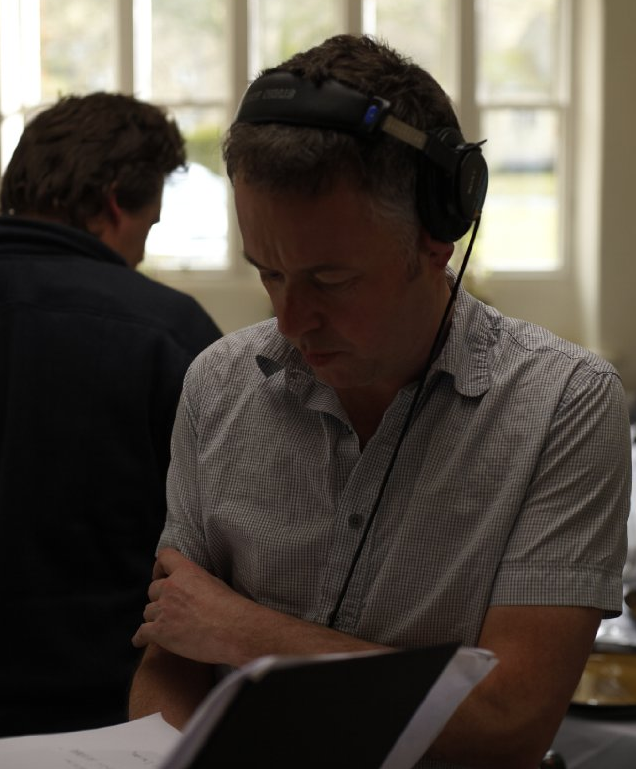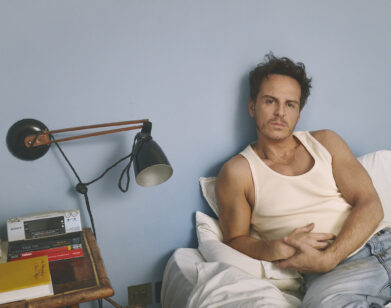What a Trip: Michael Winterbottom

It’s a bit intimidating to realize that Michael Winterbottom—the dramatic director with an an affinity for Thomas Hardy novels—is the same man as Michael Winterbottom, the master of British comedy who steered the hilarious Steve Coogan/Rob Brydon vehicle Tristram Shandy: A Cock and Bull Story in 2005. This summer, it is the latter magnum opus on which Winterbottom (who, perhaps unsurprisingly, earned an English degree from Oxford before going on to shoot 18 feature films) relies. The Trip, once again starring Coogan and Brydon as outsized versions of themselves, is an uproariously funny journey through the English countryside with the two actors as they visit several foodie establishments “Steve” has been hired to review. It’s the perfect follow-up to Tristram Shandy, and we caught up with Winterbottom, who had just come back to England from the Rajasthan set of his Venice Film Festival-bound Trishna (starring Freida Pinto), to discuss those crazy 18th-century proto-postmodernists, the narrative similarities between Victorian novels and Bollywood films, and why we could all stand to make time for lunch with two blokes named Steve and Rob.
ALISON COHN: How do you see the connection between this film and Tristram Shandy: A Cock and Bull Story (2005), and where did the inspiration come from to have Steve Coogan and Rob Brydon reprise their sort of hilariously fictionalized versions of themselves?
MICHAEL WINTERBOTTOM: When we were doing A Cock and Bull Story, it was an adaptation of The Life And Opinions of Tristram Shandy, Gentleman of course, but there’s a piece at the beginning where Steve and Rob are talking with each other while being made up and another at the end where they’re watching a rough cut of the film-within-a-film they’ve just done, which I thought was really indelible to what were the two funniest bits in the film. Since then, I’ve had quite a few lunches with Steve and Rob where they’re relaxed and can sort of relate and, you know, ramble on at length. I thought it would be quite fun to seem them do that on screen.
MICHAEL WINTERBOTTOM ON THE SET OF THE TRIP. IMAGE COURTESY OF PHIL FISK/IFC FILMS
COHN: So did you approach the two of them and say, “Would you like to do this sort of improvisational piece?” How much of it was you scripting it and how much was them just going at it?
WINTERBOTTOM: Well the idea was, why don’t we go away on a trip in the North of England? It’s where I’m from, and Steve as well. Broadly speaking, I wanted to show two people who are sharing a lot of experiences together with very different views of the world. “Rob” is a domestic, contented, stay-at-home, “everything’s OK” kind of person. And “Steve” is restless and still wanting new things, even though he’s at an age where you actually begin to think about staying with what you’ve got. I think in the end it was like 50 or 60 pages of stuff to shape the journey: background stories on “Rob” and “Steve” and different themes for their meals. But then when we were filming, they would start to talk all day, just ramble off.
COHN: In a way, they seem almost disinterested in the restaurant reviewing that is ostensibly the project at hand! [‘Steve’ has been assigned by The Observer to write a culinary column, while ‘Rob’ is along for the ride.]
WINTERBOTTOM: Yeah, initially I thought that they might engage slightly more with the food than they do, but in reality “Steve” and “Rob” just aren’t interested. Whether they’re eating a meal or walking in the countryside, they tend to talk about themselves and their lives and their films and TV projects and so on. And of course, they do their impressions. So although that wasn’t the original idea, it’s actually quite funny that they’re sort of so oblivious to all the action going on in the kitchen and all the food laid out before them.
COHN: I was wondering also about the literary context there. I initially watched A Cock & Bull Story as an English major in conjunction with reading Tristam Shandy. It struck me a bit that your protagonists, who show more interest in competing to do the best Michael Caine impression—and in the case of “Steve,” romancing at least one local chambermaid—than they do in the duck fat lollies sampled at L’Enclume, share something in common with the protagonist of Sterne’s own follow-up, A Sentimental Journey, which features a disinterested traveler talking about himself and his amorous inclinations. Was that oblique and hyper-meta connection between these two films of yours intentional?
WINTERBOTTOM: Yes, there was an “Okay, so his sequel to that was this, and this is not that different from our sequel to A Cock and Bull Story.” When we did the original research we looked at restaurants in Sutton where Sterne wrote Tristram Shandy, and I was thinking it might be funny to work that in as part of the shape of the trip itself, but decided it was too arch in a way. We went to the Lake District instead, and the Wordsworth/Coleridge thing became slightly more present than Sterne. There are also some Don Quixote references there. But in the end of course it’s not about the ideas you’re playing with, it’s really just about Steve and Rob.
COHN: Are you particularly inspired by working with literary texts? Thomas Hardy is another author whose works you’ve drawn from as source material a number of times over your career, with Jude (1996), The Claim (2000)—The Mayor of Casterbridge done as a Western—and your upcoming Tess Of The D’Urbervilles adaptation Trishna, starring Freida Pinto.
WINTERBOTTOM: I love Hardy, so obviously there’s some reason why I’m drawn back to that kind of material. When I was shooting in Rajasthan eight or nine years ago, I was struck by the elements of society there that would be really similar to the society of late 19th-century England in terms of mechanization of agriculture, industrialization, communications, and this rapid change from a rural kind of community to a much more mobile one.
COHN: So Trishna is a Victorian novel set in contemporary India?
WINTERBOTTOM: Hardy’s novels were originally written in a serialized form—in monthly installments—and have lots of melodrama, coincidence, love, death, and so on. There’s a similarity to the kind of stories you get in Bollywood film. Trishna is a character who loves dancing, and she meets a British-Indian guy who wants to become a film producer. We shot scenes in Mumbai, so it kind of overlaps into that world.
COHN: Like A Cock and Bull Story and The Trip then, Trishna is another digressive adaptation?
WINTERBOTTOM: When we made A Cock and Bull Story we showed it to a bunch of 18th-century literature experts and what they liked about it was the fact that it’s a digression away from the book—which they saw as being absolutely in spirit of the book and exactly kind of the right approach. I think when you adapt books, you’re thinking about the balance between how much you’re trying to make the film faithful to the book and how you’re just trying to make a film.
THE TRIP IS OUT IN LIMITED RELEASE TODAY.






